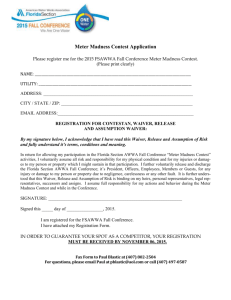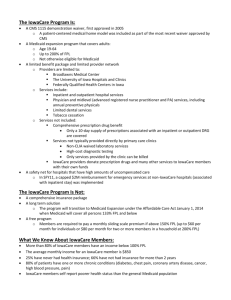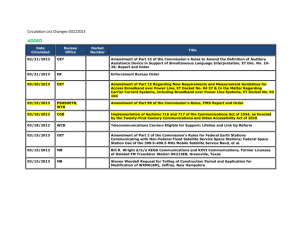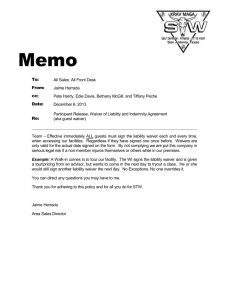04-1167.ord - Florida Public Service Commission
advertisement
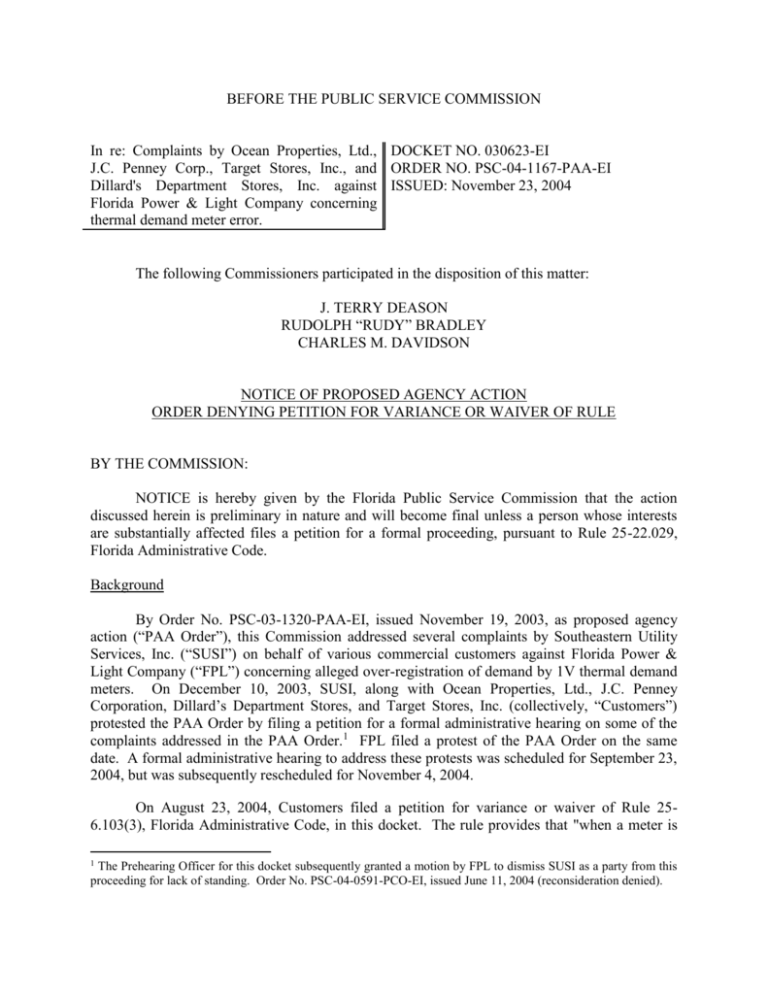
BEFORE THE PUBLIC SERVICE COMMISSION In re: Complaints by Ocean Properties, Ltd., DOCKET NO. 030623-EI J.C. Penney Corp., Target Stores, Inc., and ORDER NO. PSC-04-1167-PAA-EI Dillard's Department Stores, Inc. against ISSUED: November 23, 2004 Florida Power & Light Company concerning thermal demand meter error. The following Commissioners participated in the disposition of this matter: J. TERRY DEASON RUDOLPH “RUDY” BRADLEY CHARLES M. DAVIDSON NOTICE OF PROPOSED AGENCY ACTION ORDER DENYING PETITION FOR VARIANCE OR WAIVER OF RULE BY THE COMMISSION: NOTICE is hereby given by the Florida Public Service Commission that the action discussed herein is preliminary in nature and will become final unless a person whose interests are substantially affected files a petition for a formal proceeding, pursuant to Rule 25-22.029, Florida Administrative Code. Background By Order No. PSC-03-1320-PAA-EI, issued November 19, 2003, as proposed agency action (“PAA Order”), this Commission addressed several complaints by Southeastern Utility Services, Inc. (“SUSI”) on behalf of various commercial customers against Florida Power & Light Company (“FPL”) concerning alleged over-registration of demand by 1V thermal demand meters. On December 10, 2003, SUSI, along with Ocean Properties, Ltd., J.C. Penney Corporation, Dillard’s Department Stores, and Target Stores, Inc. (collectively, “Customers”) protested the PAA Order by filing a petition for a formal administrative hearing on some of the complaints addressed in the PAA Order.1 FPL filed a protest of the PAA Order on the same date. A formal administrative hearing to address these protests was scheduled for September 23, 2004, but was subsequently rescheduled for November 4, 2004. On August 23, 2004, Customers filed a petition for variance or waiver of Rule 256.103(3), Florida Administrative Code, in this docket. The rule provides that "when a meter is 1 The Prehearing Officer for this docket subsequently granted a motion by FPL to dismiss SUSI as a party from this proceeding for lack of standing. Order No. PSC-04-0591-PCO-EI, issued June 11, 2004 (reconsideration denied). ORDER NO. PSC-04-1167-PAA-EI DOCKET NO. 030623-EI PAGE 2 found to be in error in excess of the prescribed limits, the figure to be used for calculating the amount of refund or charge . . . shall be that percentage of error as determined by the test." Rather than calculating refunds based solely on the percentage of error determined by "the test," Customers’ petition asks for a waiver to allow refunds to be calculated, in the context of the pending formal hearing, based on: (1) use of the standard reference test point for determining meter test error as opposed to use of the full scale for determining meter test error; and (2) use of the higher of the percent error determined by "the test" or the percent difference change in monthly demand readings after a new meter was installed. Customers did not seek to consolidate this rule waiver proceeding with the formal administrative hearing in this docket set for November 4, 2004. Notice of the petition was published in the Florida Administrative Weekly on September 10, 2004. The comment period expired on September 24, 2004, and no comments were received. However, on September 13, 2004, FPL filed a motion to dismiss Customers’ rule waiver petition. In its motion to dismiss, FPL indicated that it reserved the right to address the merits of Customers’ petition during the comment period provided by statute, if the Commission chose not to dismiss Customers’ petition. Customers responded to FPL’s motion to dismiss on September 20, 2004. FPL subsequently withdrew its motion to dismiss on October 29, 2004. This Order addresses Customers’ rule waiver petition. We have jurisdiction over this matter pursuant to Section 120.542, Florida Statutes, and the provisions of Chapter 366, Florida Statutes. Standard of Review Section 120.542(1), Florida Statutes, provides a two-pronged test for determining when waivers and variances from agency rules shall be granted: Variances and waivers shall be granted when the person subject to the rule demonstrates that the purpose of the underlying statute will be or has been achieved by other means by the person and when application of the rule would create a substantial hardship or would violate principles of fairness. For purposes of this section, “substantial hardship” means demonstrated economic, technological, legal or other type of hardship to the person requesting the variance or waiver. For purposes of this section, “principles of fairness” are violated when the literal application of a rule affects a particular person in a manner significantly different from the way it affects other similarly situated persons who are subject the rule. Customers’ Petition As noted above, Customers seek a variance or waiver of Rule 25-6.103(3), Florida Administrative Code, in this docket. The rule provides that "when a meter is found to be in error in excess of the prescribed limits, the figure to be used for calculating the amount of refund or charge . . . shall be that percentage of error as determined by the test." Rather than calculating refunds based solely on the percentage of error determined by "the test," Customers’ petition ORDER NO. PSC-04-1167-PAA-EI DOCKET NO. 030623-EI PAGE 3 asks for a waiver to allow refunds to be calculated, in the context of the pending formal hearing, based on: (1) use of the standard reference test point for determining meter test error as opposed to use of the full scale for determining meter test error; and (2) use of the higher of the percent error determined by "the test" or the percent difference change in monthly demand readings after a new meter was installed. Customers note that Rule 25-6.103 identifies Sections 366.03, 366.041(1), 366.05(1), 366.05(3), 366.05(4), and 366.06(1) as the statutory sections implemented by the rule. Customers assert that the purposes of these underlying statutes are to: (1) provide for a scheme of regulation that is “fair and reasonable” to both utilities and customers; (2) require utilities to treat their customers uniformly and fairly; (3) require utilities to verify the accuracy of metering equipment through testing; (4) provide utility customers the right to have meters tested; and (5) to prevent a utility from, directly or indirectly, charging a customer with an effective rate (because of meter error) not on file with this Commission. Customers assert that these purposes will not only be achieved but enhanced by the requested variance or waiver. In addition, Customers assert that these purposes will be achieved through the evidence presented in this docket from which we will be able to determine both the amount billed in error and the refund necessary to ensure that an unapproved rate is neither charged nor collected by FPL. Customers contend that, to the extent Rule 25-6.103(3) requires use of a meter percentage error equal to a meter’s full-scale test error for calculating refunds, application of the rule works a substantial hardship on Customers and violates principles of fairness. In support of this contention, Customers cite a portion of the prefiled testimony of Staff witness Sidney W. Matlock which states that “[f]or purposes of making refunds, the calculation of a percentage error based on the full-scale reading would not be fair to the customer.” Customers suggest that FPL also recognizes the truth of the quoted portion of Mr. Matlock’s testimony, noting that FPL did not calculate refunds based solely on the meter’s tested full-scale error for all customers whose type 1V thermal demand meters – the type of meters at issue in this case – overregistered demand. Customers quote a portion of the prefiled direct testimony of FPL witness David Bromley which states that “to remove any perceptions from affected customers that they were not being treated fairly,” FPL calculated refunds using “the higher of: (1) the [full-scale] meter test error; or (2) the actual percentage difference in the monthly demand readings of the newly installed meter, i.e., the one replacing the 1V compared to the same months of the previous year’s 1V meter readings.” Customers cite an FPL interrogatory response indicating that FPL provided refunds to 263 other customers using this “higher of” method. Customers assert that they are entitled to similar “fair” treatment. Analysis and Findings For the reasons set forth below, we deny Customers’ petition for variance or waiver of Rule 25-6.103(3), Florida Administrative Code. While we believe that the purposes of the statutes underlying the rule will be achieved if the requested variance/waiver is granted, Customers have not demonstrated that application of the rule to Customers would create a substantial hardship or violate principles of fairness. Further, we believe that the requested rule waiver is inappropriate given that the interpretation and application of Rule 25-6.103(3), as well ORDER NO. PSC-04-1167-PAA-EI DOCKET NO. 030623-EI PAGE 4 as the method of calculating refunds for Customers, is at issue and is the subject of comprehensive prefiled testimony in litigation pending in this docket.2 Purpose of the Underlying Statutes We find that the requested variance or waiver would achieve the purposes of the statutes underlying Rule 25-6.103(3). Generally, we agree with Customers statement, set forth above, concerning the purposes of the statutes identified as those statutes implemented by the rule. We agree that the calculation of refunds based on some method other than the percentage error measured by a test, such as the “higher of” method used by FPL to calculate refunds for other customers using 1V meters, may be consistent with the purpose of ensuring that customers are treated fairly and not charged an effective rate (due to meter error) not on file with this Commission. Substantial Hardship / Principles of Fairness Customers’ petition for variance or waiver of Rule 25-6.103(3) asks this Commission to do two things: (1) interpret the rule’s use of the phrase “percentage of error as determined by the test” to mean the percentage of error based on the test point rather than the meter’s full-scale; and (2) require FPL to use the “higher of” method, rather than just the meter test result, to determine the appropriate refund amount due Customers. With respect to the first item, we note that the interpretation of the phrase “percentage of error as determined by the test” in subsection (3) of the rule is at issue and is the subject of prefiled testimony in the formal hearing pending in this docket. In particular, the rule does not specify which or what type of test it is referring to. Commission staff witness Matlock has prefiled testimony stating that the language in subsection (3), when viewed in light of the remainder of Rule 25-6.103, is ambiguous, and he suggests that we use the percentage of error based on the test point. FPL witness Bromley has prefiled testimony asserting that the language in subsection (3) should be read to require use of the percentage of error based on the meter’s full scale. Through their rule waiver petition, Customers ask us to decide the issue in favor of Mr. Matlock’s interpretation because it is to their advantage in the pending formal hearing proceeding. In essence, this portion of Customers’ petition requests a variance or waiver not from the rule’s requirements, but from a potential interpretation of the rule in FPL’s favor. Because the manner in which the rule will be applied is currently unknown, we do not believe that Customers have demonstrated, or even can demonstrate, that application of the rule to them will create a 2 The Prehearing Order in this docket (Order No. PSC-04-0933-PCO-EI, issued September 22, 2004) identifies the following issues implicated by Customers’ rule waiver petition: Issue 2: Pursuant to Rules 25-6.058 and 25-6.103, Florida Administrative Code, what is the appropriate method of calculating customer refunds for those thermal meters which test outside the prescribed tolerance limits? and Issue 3: Should the customers in this docket be treated the same way in which FPL treated other, similarly situated customers, for the purposes of determining the percentage of meter overregistration error? ORDER NO. PSC-04-1167-PAA-EI DOCKET NO. 030623-EI PAGE 5 substantial hardship or violate principles of fairness. We strongly believe that the interpretation and application of the rule is best left for resolution through the pending formal hearing in this docket, rather than a rule waiver petition. Parties should not be permitted, through a rule waiver petition filed in the midst of pending litigation, to obtain what amounts to summary judgment on an issue set for hearing. Customers’ second request implicates not only Issue 2 as identified in the Prehearing Order, but also Issue 3.3 Customers argue that because FPL has calculated refunds paid to other customers using the “higher of” method, application of Rule 25-6.103, which does not require this method, would violate principles of fairness. In other words, Customers claim that if we do not grant the requested variance or waiver, FPL will be allowed to treat similarly situated customers differently, thus violating principles of fairness. This argument is nearly identical to the position taken by Customers’ on Issue 3 in the pending formal hearing proceeding. At page 19 of Mr. Bromley’s prefiled direct testimony, he indicates that refunds have been calculated for the customers in this docket using the meter test error that FPL interprets the rules to require, but not the “higher of” method used to calculate refunds for other customers. In the Customers’ deposition of Mr. Bromley, he explained that all customers, including those involved in this docket, were offered 12-month refunds to be calculated using the “higher of” method in an attempt to resolve the customers’ refund claims.4 Upon deposition by FPL, Customers’ witness George Brown confirmed that the customers who pursued action in this docket did not accept FPL’s settlement offer because they believed they were entitled to a refund for greater than 12 months.5 Thus, through their rule waiver petition, Customers are asking this Commission to require FPL to give them the benefit of a favorable term that was offered by FPL as part of a settlement rejected by Customers. Based on these facts, we believe Customers have not demonstrated that application of Rule 25-6.103(3) to them will violate principles of fairness. Customers’ assertion that they will be treated differently from similarly situated customers is misleading. Based on the information before us, it clearly appears that Customers were offered the same settlement terms that every similarly situated customer was offered to resolve their refund claims. Customers rejected the settlement offer, choosing to pursue litigation before this Commission. Customers are not entitled to a rule waiver on grounds of “principles of fairness” when Customers themselves chose to be treated differently by rejecting the settlement offer that other customers accepted. It is therefore ORDERED by the Florida Public Service Commission that Customers’ petition for variance or waiver of Rule 25-6.103(3), Florida Administrative Code, is denied. It is further 3 See Footnote 2. Transcript p.156, line 8, through p. 163, line 1, from deposition of Dave Bromley taken August 5, 2004, in this docket. 5 Transcript p.90, line 8, through p.92, line 24, from deposition of George Brown taken August 27, 2004, in this docket. 4 ORDER NO. PSC-04-1167-PAA-EI DOCKET NO. 030623-EI PAGE 6 ORDERED that the provisions of this Order, issued as proposed agency action, shall become final and effective upon the issuance of a Consummating Order unless an appropriate petition, in the form provided by Rule 28-106.201, Florida Administrative Code, is received by the Director, Division of the Commission Clerk and Administrative Services, 2540 Shumard Oak Boulevard, Tallahassee, Florida 32399-0850, by the close of business on the date set forth in the "Notice of Further Proceedings" attached hereto. It is further ORDERED that this docket shall remain open pending final resolution of the Customers’ complaints in the context of the formal administrative hearing set for November 4, 2004. By ORDER of the Florida Public Service Commission this 23rd day of November, 2004. BLANCA S. BAYÓ, Director Division of the Commission Clerk and Administrative Services By: /s/ Kay Flynn Kay Flynn, Chief Bureau of Records This is a facsimile copy. Go to the Commission's Web site, http://www.floridapsc.com or fax a request to 1-850-4137118, for a copy of the order with signature. (SEAL) WCK NOTICE OF FURTHER PROCEEDINGS OR JUDICIAL REVIEW The Florida Public Service Commission is required by Section 120.569(1), Florida Statutes, to notify parties of any administrative hearing that is available under Section 120.57, Florida Statutes, as well as the procedures and time limits that apply. This notice should not be construed to mean all requests for an administrative hearing will be granted or result in the relief sought. Mediation may be available on a case-by-case basis. If mediation is conducted, it does not affect a substantially interested person's right to a hearing. ORDER NO. PSC-04-1167-PAA-EI DOCKET NO. 030623-EI PAGE 7 The action proposed herein is preliminary in nature. Any person whose substantial interests are affected by the action proposed by this order may file a petition for a formal proceeding, in the form provided by Rule 28-106.201, Florida Administrative Code. This petition must be received by the Director, Division of the Commission Clerk and Administrative Services, 2540 Shumard Oak Boulevard, Tallahassee, Florida 32399-0850, by the close of business on December 14, 2004. In the absence of such a petition, this order shall become final and effective upon the issuance of a Consummating Order. Any objection or protest filed in this/these docket(s) before the issuance date of this order is considered abandoned unless it satisfies the foregoing conditions and is renewed within the specified protest period.
